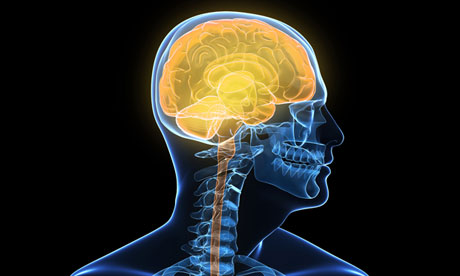The Guardian (UK) has a new psychology and neuroscience blog called
Head Quarters. This post is their introduction to the group blog (there are four bloggers), and here is a summary excerpt:
[W]e welcome you to Head Quarters, a new home at the Guardian science network for all things weird and wonderful in psychology. Our aim is to highlight both the startling insights that make psychology so fascinating, as well as the challenges we face as we interrogate the mind's secrets – not as journalistic outsiders, but as scientific insiders with ideas about how to improve matters.
The four bloggers are
Pete Etchells, a biological psychologist at Bath Spa University, whose work focuses on human vision and cognition, the behavioural impact of technology use, and the culture and practices within academic research.;
Molly Crockett, a social neuroscientist at University College London studying the neurobiology of morality, altruism and decision-making;
Thalia Gjersoe, a developmental psychologist at the Open University who studies the development of reasoning in children and the basis of magical beliefs in both children and adults; and
Chris Chambers, a cognitive neuroscientist at Cardiff University, with interests in human cognition and addiction, reforming scientific research practices, and the interplay between science, media and government.
Welcome to Head Quarters, the Guardian's new centre of operations for psychology
Psychologists face a unique challenge: we use our minds to study the mind. The observer and the observed are one and the same. Photograph: Alamy
Ask any psychologist and they'll tell you without hesitation that the most common question they get asked at parties is "Can you read my mind?" Media reports perpetuate this myth, claiming that brain scans can show "exactly what a person is imagining" or that "you love your iPhone". But stories like these paint a distorted picture of what psychologists actually do.
Psychology is a science. Imagine a scientist and you'll probably think of someone in a white lab coat examining cells by observing them through a microscope. Psychological scientists examine human thoughts and emotions by observing people's behavior and brain activity. We ask questions like: what is the mind? How does the chemistry and biology of the brain create the mind? How does the brain remember the past and imagine the future? How do we control our desires? How do we decide what is right or wrong?
In tackling these questions, psychological science faces a unique challenge: we use our minds to study the mind. The observer and the observed are one and the same. What's more, each and every one of us thinks we understand our own mind pretty darn well, and this can sometimes lead us astray. Indeed, some of the most famous discoveries in psychology are those that question our most cherished beliefs about ourselves – for instance, that most of us would never cause harm to others, or that we know what will make us happy, or that performance-based pay improves motivation.
That's why the scientific method is so important: when used correctly, it can protect us from our deep-seated biases about how the mind works and instead reveal to us glimpses of its true nature. Yet psychology is perhaps one of those areas of science that has been most visibly open to abuse in recent years, from misrepresentation of genuine research by the media and private industry, to academic fraud and questionable research practices.
So it's with all of these things in mind (pardon the pun), that we welcome you to Head Quarters, a new home at the Guardian science network for all things weird and wonderful in psychology. Our aim is to highlight both the startling insights that make psychology so fascinating, as well as the challenges we face as we interrogate the mind's secrets – not as journalistic outsiders, but as scientific insiders with ideas about how to improve matters.
Throughout this journey, we'll delve into current affairs and look at the psychological science behind politics, entertainment, business and sport. We'll scrutinize health claims related to psychology, showcase exciting new discoveries about the mind, and debunk bad science. Above all, we hope you'll also get involved by commenting on our pieces and pointing us toward issues you find interesting or that demand public attention.
Our quartet of writers includes scientists based at four British universities. Pete Etchells is a biological psychologist at Bath Spa University. His work focuses on human vision and cognition, the behavioral impact of technology use, and the culture and practices within academic research. Molly Crockett is a social neuroscientist at University College London studying the neurobiology of morality, altruism and decision-making.
Thalia Gjersoe is a developmental psychologist at the Open University. She studies the development of reasoning in children and the basis of magical beliefs in both children and adults. Chris Chambers is a cognitive neuroscientist at Cardiff University, with interests in human cognition and addiction, reforming scientific research practices, and the interplay between science, media and government.
We realize that some readers will look on psychology with enthusiasm, others with scepticism, and others – like ourselves – with a healthy dose of both. Our target audience is anyone who is interested in the science of the mind. And when it comes down to it, isn't that pretty much everyone?
Follow the Head Quarters team on Twitter: @PeteEtchells, @MollyCrockett, @NathaliaGjersoe and @chrisdc77

No comments:
Post a Comment